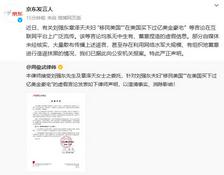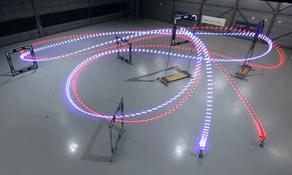Passive event listeners are a new feature in the DOM spec that enable developers to opt-in to better scroll performance by eliminating the need for scrolling to block on touch and wheel event listeners. Developers can annotate touch and wheel listeners with {passive: true} to indicate that they will never invoke preventDefault. This feature shipped in Chrome 51, Firefox 49 and landed in WebKit. Check out the video below for a side-by-side of passive event listeners in action:
Smooth scrolling performance is essential to a good experience on the web, especially on touch-based devices.
All modern browsers have a threaded scrolling feature to permit scrolling to run smoothly even when expensive
JavaScript is running, but this optimization is partially defeated by the need to wait for the results of
any touchstart and touchmove handlers, which may prevent the scroll entirely by calling preventDefault() on the event. While there are particular scenarios where an author may indeed want to prevent scrolling, analysis indicates that the majority of touch event handlers on the web never actually
call preventDefault(), so browsers often block scrolling unnecessarily. For instance, in Chrome for Android 80% of the touch events that block scrolling never actually prevent it. 10% of these events add more than 100ms of delay to the start of scrolling, and a catastrophic delay of at least 500ms occurs in 1% of scrolls.
Many developers are surprised to learn that simply adding an empty touch handler to their document can have a significant negative impact on scroll performance. Developers quite reasonably expect that the act of observing an event should not have any side-effects.
The fundamental problem here is not limited to touch events. wheel events
suffer from an identical issue. In contrast, pointer event handlers are
designed to never delay scrolling (though developers can declaratively suppress scrolling altogether with the touch-action CSS property), so do not suffer from this issue. Essentially the passive event listener proposal brings the performance properties of pointer events to touch and wheel events.
This proposal provides a way for authors to indicate at handler registration time whether the handler may call preventDefault() on the event (i.e. whether it needs an event that is cancelable). When no touch or wheel handlers at a particular point require a cancelable event, a user agent is free to start scrolling immediately without waiting for JavaScript. That is, passive listeners are free from surprising performance side-effects.
First, we need a mechanism for attaching additional information to an event listener. Today the capture argument to addEventListener is the closest example of something like this, but its usage is pretty opaque:
document.addEventListener('touchstart', handler, true);EventListenerOptions lets us write this more explicitly as:
document.addEventListener('touchstart', handler, {capture: true});This is simply the new (extensible) syntax for existing behavior - specifying whether you want the listener invoked during the capture phase or bubbling phase.
Now that we have an extensible syntax for specifying options at event handler registration time, we can add a new passive option which declares up-front that the listener will never call preventDefault() on the event. If it does, the user agent will just ignore the request (ideally generating at least a console warning), as it already does for events with Event.cancelable=false. A developer can verify this by querying Event.defaultPrevented before and after calling preventDefault(). Eg:
addEventListener(document, "touchstart", function(e) {
console.log(e.defaultPrevented); // will be false
e.preventDefault(); // does nothing since the listener is passive
console.log(e.defaultPrevented); // still false
}, Modernizr.passiveeventlisteners ? {passive: true} : false);Now rather than having to block scrolling whenever there are any touch or wheel listener, the browser only needs to do this when there are non-passive listeners (see TouchEvents spec). passive listeners are free of performance side-effects.
By marking a touch or wheel listener as passive, the developer is promising the handler won't call preventDefault to disable scrolling. This frees the browser up to respond to scrolling immediately without waiting for JavaScript, thus ensuring a reliably smooth scrolling experience for the user.
Because older browsers will interpret any object in the 3rd argument as a true value for the capture argument, it's important for developers to use feature detection or a polyfill when using this API, to avoid unforeseen results. Feature detection for specific options can be done as follows:
// Test via a getter in the options object to see if the passive property is accessed
var supportsPassive = false;
try {
var opts = Object.defineProperty({}, 'passive', {
get: function() {
supportsPassive = true;
}
});
window.addEventListener("testPassive", null, opts);
window.removeEventListener("testPassive", null, opts);
} catch (e) {}
// Use our detect's results. passive applied if supported, capture will be false either way.
elem.addEventListener('touchstart', fn, supportsPassive ? { passive: true } : false); To make this simpler you can use the feature detect from Detect It, eg:
elem.addEventListener('touchstart', fn,
detectIt.passiveEvents ? {passive:true} : false);Modernizr also has a detect here. There is an open standards debate around providing a simpler API for dictionary member feature detection.
There are scenarios where an author may intentionally want to consistently disable scrolling by cancelling all touch or wheel events. These include:
In these cases, the current behavior (which prevents scrolling optimization) is perfectly adequate, since scrolling itself is being prevented consistently. There is no need to use passive listeners in these cases, though it's often still a good idea to apply a touch-action: none CSS rule to make your intention explicit (eg. supporting browsers with Pointer Events but not Touch Events).
However, in a number of common scenarios events don't need to block scrolling - for instance:
touchstart handlers that hide some active UI (like tooltips)touchstart and touchend handlers that style UI elements (without suppressing the click event).For these scenarios, the passive option can be added (with appropriate feature detection) without any other code changes, resulting in a significantly smoother scrolling experience.
There are a few more complicated scenarios where the handler only wants to suppress scrolling under certain conditions, such as:
preventDefault() (test page).preventDefault should be conditional on the lack of support for the particular touch-action rule being used (note that Safari 9 currently only supports touch-action: manipulation).touch-action as above (treating Touch Events as you would Pointer Events.You can get a quick idea of the benefit possible (and potential breakage) by forcing touch/wheel listeners to be treated as passive via chrome://flags/#passive-listener-default (new in Chrome 52). This makes it easy to do your own side-by-side comparisons like this popular video.
See this video for tips on how to use Chrome's Developer Tools to identify listeners that are blocking scrolling. You can monitor event timestamps to measure scroll jank in the wild, and use Chromium's tracing system to look at the InputLatency records for scrolling when debugging.
The Chrome team is working on a proposal for both a PerformanceTimeline API and more DevTools features to help web developers get better visibility into this problem today.
When a page exhibits substantial scroll jank, it's always an indication of an underlying peformance issue somewhere. Passive event listeners do nothing to address these underlying issues, so we still strongly encourage developers to ensure that their application meets the RAIL guidelines even on low-end devices. If your site has logic that runs for >100ms at a time, it will still feel sluggish in response to taps / clicks. Passive event listeners just allow developers to decouple the issue of having JS responsiveness reflected in scroll performance from the desire to monitor input events. In particular, developers of third-party analytics libraries can now have some confidence that their use of light-weight event listeners will not fundamentally change the observed performance characteristics of any page using their code.
See the links here for more details. For questions or concerns, feel free to file issues on this repo, or reach out to @RickByers.
京东创始人刘强东和其妻子章泽天最近成为了互联网舆论关注的焦点。有关他们“移民美国”和在美国购买豪宅的传言在互联网上广泛传播。然而,京东官方通过微博发言人发布的消息澄清了这些传言,称这些言论纯属虚假信息和蓄意捏造。
日前,据博主“@超能数码君老周”爆料,国内三大运营商中国移动、中国电信和中国联通预计将集体采购百万台规模的华为Mate60系列手机。
据报道,荷兰半导体设备公司ASML正看到美国对华遏制政策的负面影响。阿斯麦(ASML)CEO彼得·温宁克在一档电视节目中分享了他对中国大陆问题以及该公司面临的出口管制和保护主义的看法。彼得曾在多个场合表达了他对出口管制以及中荷经济关系的担忧。
今年早些时候,抖音悄然上线了一款名为“青桃”的 App,Slogan 为“看见你的热爱”,根据应用介绍可知,“青桃”是一个属于年轻人的兴趣知识视频平台,由抖音官方出品的中长视频关联版本,整体风格有些类似B站。
日前,威马汽车首席数据官梅松林转发了一份“世界各国地区拥车率排行榜”,同时,他发文表示:中国汽车普及率低于非洲国家尼日利亚,每百户家庭仅17户有车。意大利世界排名第一,每十户中九户有车。
近日,一项新的研究发现,维生素 C 和 E 等抗氧化剂会激活一种机制,刺激癌症肿瘤中新血管的生长,帮助它们生长和扩散。
据媒体援引消息人士报道,苹果公司正在测试使用3D打印技术来生产其智能手表的钢质底盘。消息传出后,3D系统一度大涨超10%,不过截至周三收盘,该股涨幅回落至2%以内。
9月2日,坐拥千万粉丝的网红主播“秀才”账号被封禁,在社交媒体平台上引发热议。平台相关负责人表示,“秀才”账号违反平台相关规定,已封禁。据知情人士透露,秀才近期被举报存在违法行为,这可能是他被封禁的部分原因。据悉,“秀才”年龄39岁,是安徽省亳州市蒙城县人,抖音网红,粉丝数量超1200万。他曾被称为“中老年...
9月3日消息,亚马逊的一些股东,包括持有该公司股票的一家养老基金,日前对亚马逊、其创始人贝索斯和其董事会提起诉讼,指控他们在为 Project Kuiper 卫星星座项目购买发射服务时“违反了信义义务”。
据消息,为推广自家应用,苹果现推出了一个名为“Apps by Apple”的网站,展示了苹果为旗下产品(如 iPhone、iPad、Apple Watch、Mac 和 Apple TV)开发的各种应用程序。
特斯拉本周在美国大幅下调Model S和X售价,引发了该公司一些最坚定支持者的不满。知名特斯拉多头、未来基金(Future Fund)管理合伙人加里·布莱克发帖称,降价是一种“短期麻醉剂”,会让潜在客户等待进一步降价。
据外媒9月2日报道,荷兰半导体设备制造商阿斯麦称,尽管荷兰政府颁布的半导体设备出口管制新规9月正式生效,但该公司已获得在2023年底以前向中国运送受限制芯片制造机器的许可。
近日,根据美国证券交易委员会的文件显示,苹果卫星服务提供商 Globalstar 近期向马斯克旗下的 SpaceX 支付 6400 万美元(约 4.65 亿元人民币)。用于在 2023-2025 年期间,发射卫星,进一步扩展苹果 iPhone 系列的 SOS 卫星服务。
据报道,马斯克旗下社交平台𝕏(推特)日前调整了隐私政策,允许 𝕏 使用用户发布的信息来训练其人工智能(AI)模型。新的隐私政策将于 9 月 29 日生效。新政策规定,𝕏可能会使用所收集到的平台信息和公开可用的信息,来帮助训练 𝕏 的机器学习或人工智能模型。
9月2日,荣耀CEO赵明在采访中谈及华为手机回归时表示,替老同事们高兴,觉得手机行业,由于华为的回归,让竞争充满了更多的可能性和更多的魅力,对行业来说也是件好事。
《自然》30日发表的一篇论文报道了一个名为Swift的人工智能(AI)系统,该系统驾驶无人机的能力可在真实世界中一对一冠军赛里战胜人类对手。
近日,非营利组织纽约真菌学会(NYMS)发出警告,表示亚马逊为代表的电商平台上,充斥着各种AI生成的蘑菇觅食科普书籍,其中存在诸多错误。
社交媒体平台𝕏(原推特)新隐私政策提到:“在您同意的情况下,我们可能出于安全、安保和身份识别目的收集和使用您的生物识别信息。”
2023年德国柏林消费电子展上,各大企业都带来了最新的理念和产品,而高端化、本土化的中国产品正在不断吸引欧洲等国际市场的目光。
罗永浩日前在直播中吐槽苹果即将推出的 iPhone 新品,具体内容为:“以我对我‘子公司’的了解,我认为 iPhone 15 跟 iPhone 14 不会有什么区别的,除了序(列)号变了,这个‘不要脸’的东西,这个‘臭厨子’。









